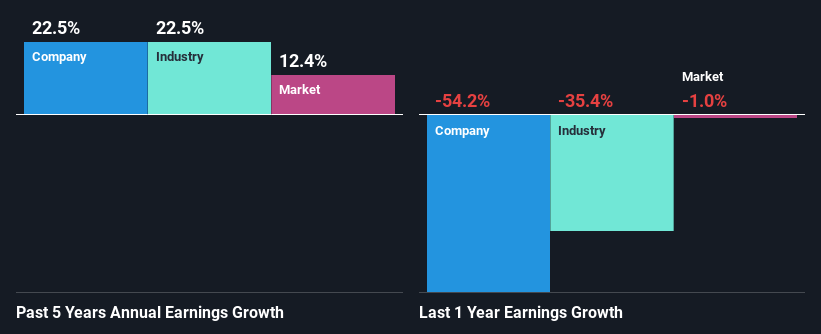Stock Analysis
- United Kingdom
- /
- Oil and Gas
- /
- LSE:SHEL
Is Shell plc's (LON:SHEL) Latest Stock Performance A Reflection Of Its Financial Health?

Shell (LON:SHEL) has had a great run on the share market with its stock up by a significant 19% over the last three months. Since the market usually pay for a company’s long-term fundamentals, we decided to study the company’s key performance indicators to see if they could be influencing the market. In this article, we decided to focus on Shell's ROE.
Return on equity or ROE is a key measure used to assess how efficiently a company's management is utilizing the company's capital. In other words, it is a profitability ratio which measures the rate of return on the capital provided by the company's shareholders.
See our latest analysis for Shell
How Is ROE Calculated?
Return on equity can be calculated by using the formula:
Return on Equity = Net Profit (from continuing operations) ÷ Shareholders' Equity
So, based on the above formula, the ROE for Shell is:
10% = US$20b ÷ US$188b (Based on the trailing twelve months to December 2023).
The 'return' is the income the business earned over the last year. So, this means that for every £1 of its shareholder's investments, the company generates a profit of £0.10.
Why Is ROE Important For Earnings Growth?
So far, we've learned that ROE is a measure of a company's profitability. Based on how much of its profits the company chooses to reinvest or "retain", we are then able to evaluate a company's future ability to generate profits. Assuming all else is equal, companies that have both a higher return on equity and higher profit retention are usually the ones that have a higher growth rate when compared to companies that don't have the same features.
Shell's Earnings Growth And 10% ROE
To begin with, Shell seems to have a respectable ROE. Even so, when compared with the average industry ROE of 13%, we aren't very excited. That being the case, the significant five-year 23% net income growth reported by Shell comes as a pleasant surprise. We reckon that there could be other factors at play here. Such as - high earnings retention or an efficient management in place. Bear in mind, the company does have a respectable ROE. It is just that the industry ROE is higher. So this also does lend some color to the high earnings growth seen by the company.
We then performed a comparison between Shell's net income growth with the industry, which revealed that the company's growth is similar to the average industry growth of 23% in the same 5-year period.

Earnings growth is an important metric to consider when valuing a stock. It’s important for an investor to know whether the market has priced in the company's expected earnings growth (or decline). Doing so will help them establish if the stock's future looks promising or ominous. Has the market priced in the future outlook for SHEL? You can find out in our latest intrinsic value infographic research report.
Is Shell Efficiently Re-investing Its Profits?
Shell's three-year median payout ratio is a pretty moderate 28%, meaning the company retains 72% of its income. By the looks of it, the dividend is well covered and Shell is reinvesting its profits efficiently as evidenced by its exceptional growth which we discussed above.
Moreover, Shell is determined to keep sharing its profits with shareholders which we infer from its long history of paying a dividend for at least ten years. Looking at the current analyst consensus data, we can see that the company's future payout ratio is expected to rise to 35% over the next three years. Regardless, the future ROE for Shell is speculated to rise to 13% despite the anticipated increase in the payout ratio. There could probably be other factors that could be driving the future growth in the ROE.
Conclusion
In total, we are pretty happy with Shell's performance. Particularly, we like that the company is reinvesting heavily into its business at a moderate rate of return. Unsurprisingly, this has led to an impressive earnings growth. That being so, a study of the latest analyst forecasts show that the company is expected to see a slowdown in its future earnings growth. To know more about the company's future earnings growth forecasts take a look at this free report on analyst forecasts for the company to find out more.
Valuation is complex, but we're helping make it simple.
Find out whether Shell is potentially over or undervalued by checking out our comprehensive analysis, which includes fair value estimates, risks and warnings, dividends, insider transactions and financial health.
View the Free AnalysisHave feedback on this article? Concerned about the content? Get in touch with us directly. Alternatively, email editorial-team (at) simplywallst.com.
This article by Simply Wall St is general in nature. We provide commentary based on historical data and analyst forecasts only using an unbiased methodology and our articles are not intended to be financial advice. It does not constitute a recommendation to buy or sell any stock, and does not take account of your objectives, or your financial situation. We aim to bring you long-term focused analysis driven by fundamental data. Note that our analysis may not factor in the latest price-sensitive company announcements or qualitative material. Simply Wall St has no position in any stocks mentioned.

Simply Wall St
About LSE:SHEL
Shell
Shell plc operates as an energy and petrochemical company Europe, Asia, Oceania, Africa, the United States, and Rest of the Americas.
Flawless balance sheet and fair value.
